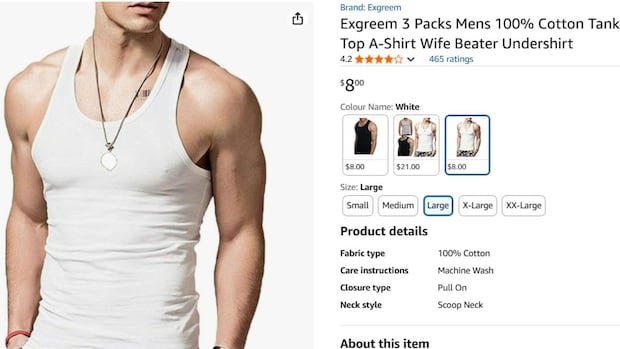Several advertisements showcasing men’s tank tops can still be found on Amazon’s Canadian platform, despite a ruling from the Ad Standards Council deeming the term “wife beater” offensive and a violation of Canada’s advertising standards. The colloquial expression refers to a specific style of tight-fitting tank tops that originated in the 1930s as men’s undergarments. The shirt gained prominence in 1951 when Marlon Brando sported one in the role of Stanley Kowalski in the film “A Streetcar Named Desire.”
Criticism has been directed at Amazon for continuing to allow the use of the term, with women’s rights advocates expressing frustration over the retailer’s stance. Harmy Mendoza, the executive director of WomanACT, a group dedicated to ending intimate partner violence, emphasized the need for a culture that respects women and survivors, condemning the term as offensive and insulting.
In response to the controversy, Mendoza initiated a petition urging Amazon to remove the phrase from its listings, emphasizing the normalization of gender-based violence and the importance of fostering a society that discourages such behavior.
Despite a previous ruling by Ad Standards Canada in 2024 that found an Amazon ad for a men’s “wife beater” tank top to be in violation of advertising standards, the company has opted not to comply with the council’s request to amend or remove the ad. Amazon defended its use of the term, stating that it is commonly understood in retail and popular culture and does not breach its Offensive Products Policy.
CBC News discovered ten ads for “wife beater” tank tops offered by third-party sellers on Amazon and raised concerns with the company, prompting Amazon to reiterate its commitment to maintaining an inclusive marketplace while considering cultural sensitivities in its product listings.
Notably, only one seller, WANGYUNHUI2025, responded to the concerns by removing the term from their ads and expressing regret over the oversight. Calls for a regulatory body to oversee harmful content on online platforms have intensified, with activists advocating for mechanisms to compel corporations to make necessary changes to protect users.


